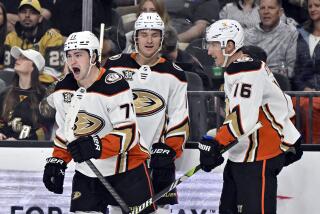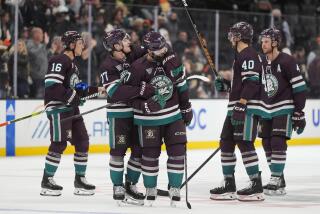Life’s Lessons Learned
He came to the Mighty Ducks in 1994 as a fresh-faced 18-year-old barely out of high school, carrying upon his slender shoulders every bit of the angst that teenage years entail.
He returned this summer as a young man, older and wiser. His shoulders are broader. He stands taller. Perhaps he’s grown another inch. His voice is deeper, the words more assured.
Yes, Oleg Tverdovsky grew up in the more than three years he was away.
“There are a lot of things you have to learn, a lot of lessons,” Tverdovsky said.
He was speaking about hockey, but he also could have been talking about his life.
“My first year here I had some problems,” he continued. “It didn’t go smoothly at the beginning. There was the lockout. [But] it was still a great experience to play at that age.”
In many ways, Tverdovsky is very much like the kid next door who went to college a boy and returned home a man. It happens on every block in every city, so why shouldn’t it happen in the Ducks’ neighborhood?
Amazing as it seems, Tverdovsky is still only 23. But he’s starting his sixth NHL season and his second stint with the Ducks.
The Ducks believe he’s still scratching the surface of his talents. Better days are just around the corner, they say.
After all, Tverdovsky plays defense, one of hockey’s toughest positions to master.
A young forward with goal-scoring skills merely has to fire the puck at the net. Soon enough, it will go in. His talents have already been honed through junior-level games dating to age 12.
A young grinder simply throws his body at the opposition, his hard work making up for a lack of touch around the net.
But a defenseman?
He must be flawless in his puck-handling and his positioning. Mistakes up front can be erased by retreating forwards and alert defensemen.
But mistakes by the defense often wind up in the back of the net. Only a sharp goaltender can bail out a defenseman.
There simply is no substitute for experience for a defenseman. It’s why many of the best are well into their 30s. Teenagers simply do not excel on defense.
Even 23-year-olds with five season’s worth of experience sometimes fail miserably.
“He had, obviously, a lot of expectations on him,” said goaltender Guy Hebert, the last original Duck and the franchise’s unofficial historian.
“I remember we used to sit around in the dressing room and wonder, ‘Who’s going to be better, Paul [Kariya] or Oleg?’ It’s tough for any 18-year-old to step into the NHL. You really have to be an exceptionally mature person to step right into the role.”
DUCKS, JETS AND COYOTES: A LONG, STRANGE TRIP
Two winning seasons, two playoff appearances and three coaches in a three-season span were all in the future when the Ducks joined 25 other teams for the 1994 entry draft in Hartford, Conn.
The Ducks were feeling smug at having tied their fellow 1993-94 expansionists, the Florida Panthers, in winning 33 games, the most in league history for a first-year team.
Management had a pretty good idea the heroes of ‘93-94 would soon be gone, ready for retirement or traded after failing to recapture past glories. In the words of former Coach Ron Wilson, “We can’t rest on our laurels because we haven’t got any.”
So team officials focused their attention on drafting a young defenseman from the Ukraine. It was assumed that an NHL job was Tverdovsky’s to lose.
Predictably, the results were mixed. A lockout delayed the opening of the ‘94-95 season until January. Wilson tossed Tverdovsky into the fray, hoping the youngster would learn by doing.
Tverdovsky was spectacular at times, but more often appeared to be a child playing in a man’s game. He managed three goals and 12 points in 36 games during his rookie season.
You could see the signs of improvement over the course of 51 games in 1995-96. Tverdovsky was far steadier and played with more confidence as his second season progressed.
Then on Feb. 7, 1996, his world was turned upside down. The Ducks sent Tverdovsky, rookie Chad Kilger and a third-round selection in the 1996 draft to the Winnipeg Jets for right wing Teemu Selanne and minor-leaguer Marc Chouinard.
It ranked as grand larceny. Selanne was a star, having scored a rookie-record 76 goals in 1992-93. Tverdovsky was a star in the making.
“I didn’t expect to be traded,” Tverdovsky said. “I really liked it here. They said, ‘Well, you’re going to Winnipeg.’ I said, ‘Winnipeg?’
“It was a hard time for me. It makes you appreciate where you live more. You appreciate the ocean, walking on the beach.”
Winnipeg in winter is a harsh, uninviting town--no beach, no waves, no sun. On the plus side, Tverdovsky still had an NHL job.
“Nobody wants to get traded, but maybe it makes you stronger,” he said.
When the Jets relocated to sunny Phoenix and became the Coyotes to start the 1996-97 season, Tverdovsky seemed ready to grow with the franchise. He had 10 goals and 55 points, played in the NHL All-Star game and helped the Coyotes reach the Stanley Cup playoffs, where the Ducks awaited in a first-round matchup.
A year earlier, the Jets edged out the Ducks by a single victory in the fight for the eighth and final playoff spot in the Western Conference.
A simmering hatred was already brewing when Tverdovsky and the Coyotes stepped aboard the team bus after their 1996-97 regular-season finale in Edmonton.
Informed of the Coyotes’ playoff opponent, Tverdovsky said, in part, “I hate that team. I hope we kick their butts.” A reporter for a Phoenix newspaper was there to record every word. Tverdovsky’s comments also appeared in The Times.
The reaction was predictable as the Coyotes and Ducks squared off for Game 1 at the Arrowhead Pond. A roaring sellout crowd of 17,174 booed Tverdovsky each time he handled the puck.
The Ducks won an emotional seven-game series that ranks among the best first-round matchups in recent memory. A rivalry was established and a villain cast in the form of a shy, polite youngster named Oleg Tverdovsky.
DUCKS REDUX: WELCOME BACK, OLEG
Trades tend to mend old wounds in the NHL.
The Ducks snookered the Coyotes again last June, reacquiring Tverdovsky for center Travis Green and a draft pick, and the consensus was that all would be forgiven.
Tverdovsky received news of the trade while in Moscow. It was 4 a.m. when he took the call and heard the unexpected but welcomed news.
“It was strange,” Tverdovsky said of his first day of training camp at the Ducks’ Anaheim practice facility. “I walked in and everything was the same. Nothing had changed. The guys were all good to me. They made me feel a lot more comfortable.”
Tverdovsky certainly didn’t relax, however. He had a great deal to prove--to his new teammates, to a new coaching staff and to the Coyotes.
“Certainly, he’s been great for us to work with,” Duck Coach Craig Hartsburg said. “He’s done everything we’ve asked of him. He’s an extremely hard worker. This is a new year. Everything in the past is over with. He came to training camp with a fresh start.
“Our first impression of him is that he’s a lot of fun to be around. I don’t know what’s gone on in the past and I don’t really care.”
Tverdovsky is diplomatic when talking about his tenure with the Coyotes.
“I’m not going to say it was a bad season,” he said of 1998-99. “I really learned a lot about playing defense. We played a certain system and we had to stick with that system. It’s hard to say why I didn’t get 50 points or 60 points.”
Some say Tverdovsky chafed under the conservative game plan of former Phoenix Coach Jim Schoenfeld and constant hazing by several veterans. According to many observers, that’s why Tverdovsky managed only seven goals and 25 points last season.
“With Oleg there were so many expectations,” said Duck left wing Jim McKenzie, who played with Tverdovsky from the 1996 trade until 1997-98. “It’s not an easy thing to be the main guy when the team’s not scoring and the power play is struggling.
“It will never be easy for Oleg because what’s expected of him is so great. When things aren’t going well and he’s in the doghouse, you tend to forget that he’s only 23.”
The Ducks remember. They won’t heap the pressure to produce upon him as they did in his first stint in Anaheim. They also won’t stand for the grousing and ill feelings reportedly directed his way by veterans in Phoenix.
In Anaheim, veteran defenseman Fredrik Olausson will continue to quarterback the power-play unit, giving Tverdovsky time to grow into a worthy successor in seasons to come.
The Ducks have a great deal invested in Tverdovsky over the long haul. Now that he’s back, they are determined to let him evolve into the world-class player they always believed he could be.
“You learn more and more every year,” Tverdovsky said. “To develop and to stay on top you have to work hard every day and do what’s needed. That’s what makes you a professional.”
More to Read
Go beyond the scoreboard
Get the latest on L.A.'s teams in the daily Sports Report newsletter.
You may occasionally receive promotional content from the Los Angeles Times.






